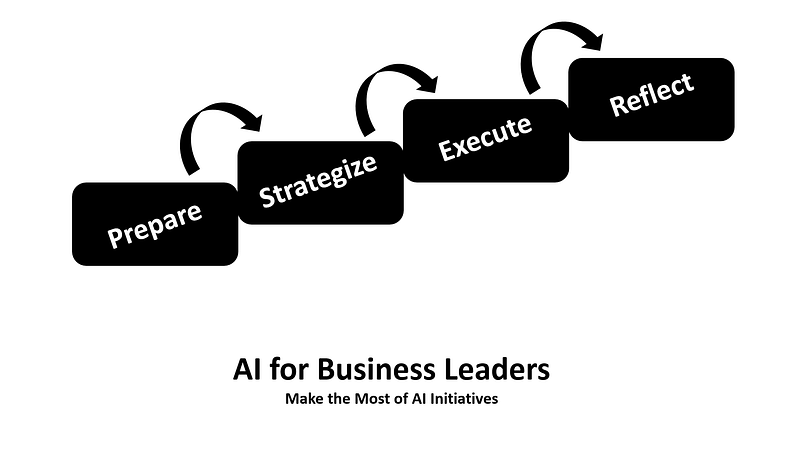Artificial Intelligence for Business Leaders
 on [Unsplash](https://unsplash.com/search/photos/leaders?utm_source=unsplash&utm_medium=referral&utm_content=creditCopyText)](https://cdn-images-1.medium.com/max/1200/1*J8upfmjxMdQDCppmtfZnCg.jpeg)
It is no secret that data is the new oil and AI is the new electricity. Due to the difference AI can make in every walk of life, it is the red hot subject among recent graduates/undergraduates and working professionals in different industries.
It is not only up to the technical team to make AI initiatives a success in the organization. Business value creation is driven top-down so business leaders are equally responsible for the success or failure of AI initiatives.
If you look at the failure rate of AI projects and the challenges faced by AI teams, you can easily figure out that most of the challenges are because of the absence of data culture in an organization. And data culture can’t be inculcated in a day, it takes efforts and leadership needs to drive it as part of their change management program.
Apart from infusing data culture in the organization, most of the decisions in business are made by its leaders, AI is providing huge opportunity to many areas of business across domains. Hence as a leader or manager, understanding AI and applying it effectively in our organization can make all the difference between us and our competitors.
Recently I published a book for AI starters and enthusiasts, where I shared a learning framework on how they can get into AI and during my discussions with managers and business leaders, they asked me if a similar framework can be built for business leaders.
Framework
If we look at the day to day working of managers and leaders, they need not know each and everything of the work & resources they are managing but just enough awareness can make a huge impact on AI initiatives. It helps in setting the right expectations with the customer or business, defining better strategy, anticipating challenges and understanding the concerns of the team.
So here is the framework that I came up with for business leaders & managers: Prepare, Strategize, Execute, Reflect.

Let us have a look at each of the phase of the above framework:
Prepare
AI is a new & evolving field, the first phase for us is to prepare ourselves to run these AI initiatives.
The very first step we need to take is to navigate the overall landscape. What are AI, ML, DL, DS, DM, BI terms? How they are interconnected? What is the typical lifecycle to execute AI project? What are the different roles and skill-set required in the lifecycle?
The second step would be to build the capability to execute AI projects. More we work on our concepts and skill-set, more we will be comfortable to run such projects and handling teams.
Strategize
After working on our concepts & skill-set, we are ready to work with a team on AI projects but hold on. How do we know what are the opportunities in our organization? Working on which projects would be more beneficial than others? To get answers to these questions, we need to define an AI strategy based on our organization & industry.
Apart from defining the strategy, we need to have an operational framework in place to get a clear understanding of what is to be done and who will be doing what.
Another area for leaders/manager is to anticipate what challenges their teams would face while working on AI projects. Having a view beforehand will help you to handle the challenges better.
Execute
This phase covers managing the on-field execution of AI projects. As AI projects are different from typical IT projects, we need to emphasize quick POC to get a better view of the problem & to provide optimized estimates of the overall efforts.
From managing stakeholders’ expectations to understanding the functional aspect of the use case to deployment & monitoring of the final solution, you need to manage everything and also need to tackle the day to day challenges your team faces.
Reflect
The last phase is to reflect on how the whole project went and what we can take out from it to do better in other upcoming AI projects.
Firstly, we need to analyse the results of our deployed solution and compare it with the initially estimated output. We also need to take the customer or business feedback on the results and agree on monitoring and maintenance framework.
Obviously, being an AI project, not everything would go smooth. Every organization has a culture and way of doing things, which may or may not be in line with what we require for our AI initiatives. So based on the lessons learnt from the current AI project, we may need to update our AI strategy & operational framework to suit our opportunities & constraints in a better way.
As you see, the above approach & framework captures what a business leader or manager needs to know and work out to make AI initiative successful for his organization. It takes vision, strategy, efforts & some self-reflection at the end.
Ankit Rathi is an AI architect, published author & well-known speaker. His interest lies primarily in building end-to-end AI applications/products following best practices of Data Engineering and Architecture.
Why don’t you connect with Ankit on YouTube, Twitter, LinkedIn or Instagram?
If you have any questions or comments, click the "Go To Discussion" button below!



